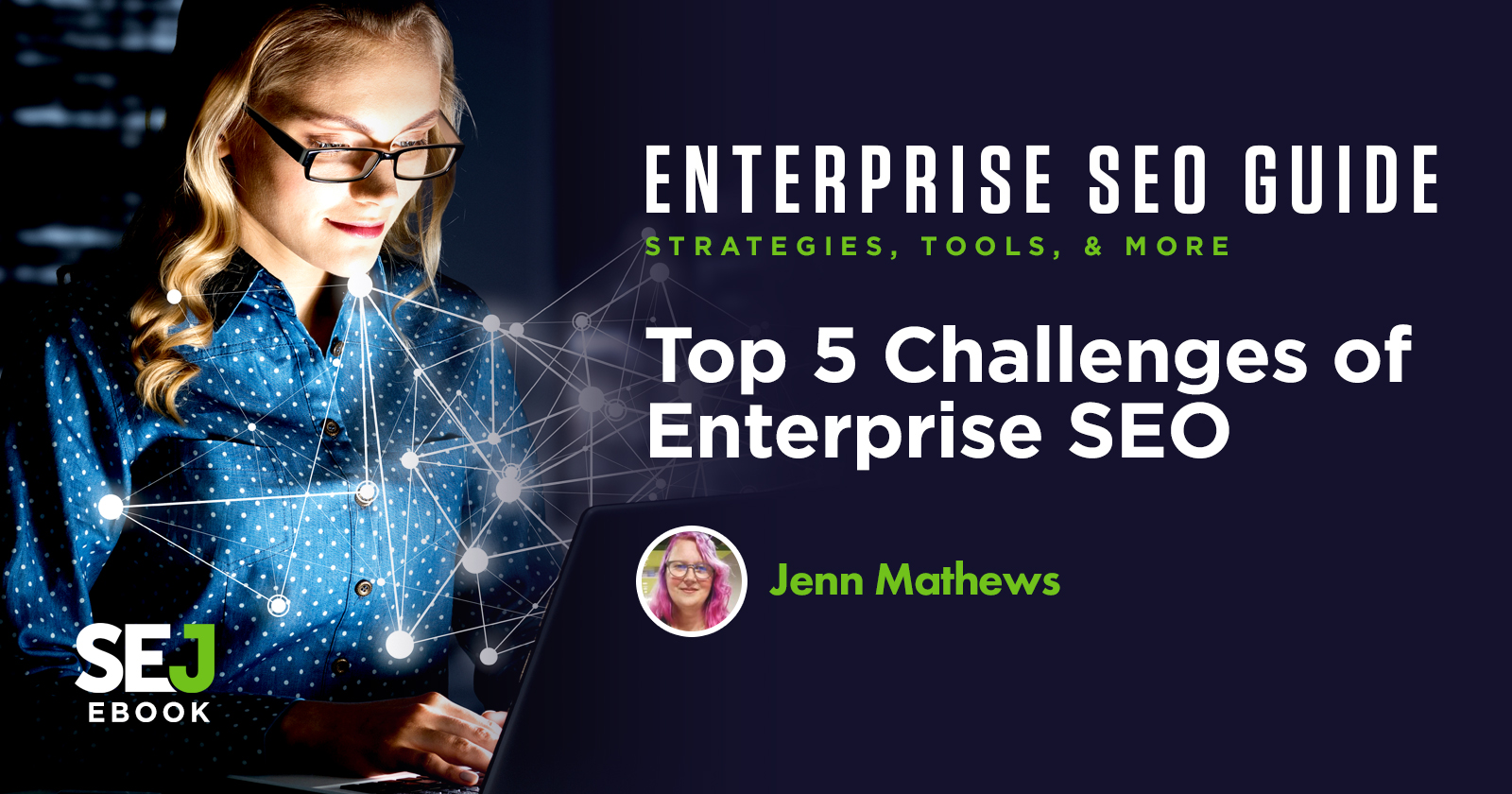What makes enterprise SEO unique from a general knowledge in SEO?
The complexities.
A larger company has the technical challenges of a complex site architecture to getting budget for the tools and help needed to be successful.
I have seen many SEO professionals come from consulting or agency environments who have strong technical, content, and general knowledge of SEO.
What they lack, however, is the ability to work with other teams or understand the complexities that enterprise organizations face.
Without the experience of working in-house in such an environment, any SEO professional will struggle to gain credibility or make any sort of impact – resulting in a stagnant outcome with no signs of growth.
Here are the top five challenges any SEO might face when working in an enterprise environment:
- Complex technical challenges.
- Getting buy-in.
- Priority for the business.
- Tracking effectiveness.
- Budget for tools/help.
If you can navigate through these challenges then support from the organization – all the way from the top down – will become strong, allowing for the overall health of the company’s SEO to flourish.
1. Complex Technical Challenges for SEO
When it comes to technical SEO for enterprise organizations, the level of complexity increases tenfold.
Sites that don’t focus on the technical aspects of SEO will often fall short no matter how excellent content, brand recognition, or link authority is.
When a site has 90% of its pages throwing errors around redirect chains, improper or self canonicals, duplicate titles, JavaScript issues, etc. are less likely to get results than their competitors who have only 20% (or less) of those issues.
New projects that are launched are less likely to gain traction in the search results or may struggle to ever get indexed at all.
Larger organizations consist of multiple engineering teams working on several aspects to a site and often on different platforms.
When entering into an enterprise environment, it’s good to understand that your first few months are going to be about learning:
- How a site is structured.
- How the engineering teams work.
- How SEO can play a part.
From the use of subdomains/subdirectories, pushing sitemaps.xml files, generating robots.txt, identifying pages that need or have noindex tags, pagination, JavaScript implementation, how canonical tags are generated, pagination, infinite scrolling, Ajax calls, and so much more.
All of this may be common knowledge, however, working in the enterprise environment with a large site managed by multiple stakeholders that have business decisions that could impact SEO adds a level of complexity that is a challenge to navigate.
When dealing with the complexities of technical SEO in an enterprise environment, an SEO must not only be knowledgeable but be willing to listen.
A strong enterprise SEO can look at data, analyze crawl reports and web logs, and know who to talk to in order to understand the history of the work that has been done for SEO.
A good SEO should be able to make authoritative decisions while maintaining humbleness as trial and error tests present the best results.
By focusing 30% of the team’s effort on technical SEO fixes and mitigating additional issues, an enterprise site will have greater success.
2. Getting Buy-in
Ask any SEO and they will tell you how obvious it is why companies should invest time and money into SEO.
With a little effort from engineering, some tweaking by the content teams, and a small investment in SEO experts any company could make money with very little overhead.
Unfortunately, not all organizations see it that way.
Whether it’s a lack of understanding of what SEO is or what all that goes into SEO companies don’t often see it as a worthy investment.
SEO professionals should know that working within an organization doesn’t make it any easier to get work done for SEO.
Calendars could be filled with meetings all day but a discussion might come up in a meeting where stakeholders decide that SEO isn’t important and the SEO wasn’t in the room.
Later they find out that after a project was launched the company could have benefited greatly from considering SEO.
The key to getting buy-in for SEO is for an SEO to get to know as many people as possible in the organization from the top down.
Even when it doesn’t seem like someone will ever need or ever work with SEO, it’s still good to get to know them and their role.
One of those people could be in a meeting the SEO is left out of when a group decides that they don’t need SEO. In which case they would be able to speak up for SEO in their absence.
Additionally, any successes the team can have for SEO are always a good way to get organizational buy-in.
Find some pages or a section of the website that could use some changes to help improve SEO and report on the growth that you have accomplished.
This will show stakeholders and decision-makers that some work for SEO can increase traffic and revenue.
They will have more respect for SEO as well as the team that works on SEO and will want the same for their projects and responsibilities.
Getting buy-in from key stakeholders on what it takes to get work done for SEO is one of the biggest struggles any SEO faces in a larger organization.
From convincing the CEO that SEO can increase the bottom line, all the way down to getting engineering teams to spend the time to make their JavaScript crawlable by Google, SEO pros can spend a lot of time getting buy-in.
Subscribe for Daily Search Insights
AI, PPC, and digital marketing news distilled to fuel success. Join the other 75k marketers!
3. Priority for the Business
I will, at times, refer to SEO as the red-headed stepchild (a phrase used to describe a person who is neglected, mistreated, or unwanted) of the business.
Many companies know that they can benefit from SEO, but don’t understand enough about it to make it a priority.
Organizations that end up in this hole of lack of support, or understanding for SEO, have a difficult time digging themselves out and therefore reaping any benefit from SEO.
While getting stakeholders to buy-into SEO, it’s also important to push to establish SEO as one of the important priorities for the business as a whole.
By communicating with the business showing small, or even large, wins a team can establish SEO as a priority and align with what the business has planned for.
If the business is focused on location targeting for advertising and building content for local customers, then it would be wise to focus efforts on local SEO strategies.
Aligning with the business isn’t always an easy task, and not all organizations are transparent when it comes to communicating what is a priority to the SEO level.
By focusing on getting to know teams and stakeholders within the organization the SEO team could become part of the conversation when there are talks about priorities for the business.
While getting SEO established as a priority for the business is a struggle, the benefits can be astronomical for both the business and the SEO team.
4. Tracking Effectiveness
Many times I have worked with agencies that report on their wins by showing keywords that have moved up in rankings, or pages they have worked on appearing higher in the search results.
The biggest struggle that SEO will often have within a large organization is reporting. Most enterprise businesses expect SEO to impact revenue.
While ranking changes and increases in traffic are nice, everything boils down to how much the company makes.
Tracking keywords to revenue is virtually impossible.
Calculating can be a complex estimation based on formulas with an understanding of what pages showed up for which keyword searches, with a count of keywords to that page, cut by percentages of Google traffic from organic from how much that page generated in revenue.
It’s a formula that isn’t always doable for each business, especially in times where there are multiple pages that appear in search results for a keyword.
The best way to track SEO’s effectiveness is to understand what is important for the business.
Some businesses are happy with free signups and might have a revenue value associated with them.
Some businesses have a calculation of revenue per user or consider a click of a button, or email open as a value.
Working with data scientists and understanding hurdles associated when reporting for SEO is one of the biggest struggles an SEO faces in a larger organization.
5. Budget for Tools/Help
One of the biggest struggles I have faced in all my years as an SEO and working for many enterprise organizations is getting support and budget to hire help (agencies, consultants, or staff) and the tools needed that can handle large complex systems.
Hiring agencies that have the technical knowledge, experience, and understanding of what it takes to manage SEO for large organizations are few and far in-between, and they don’t come cheap.
Getting budget support for the expert help needed takes a lot of hard work and scrappiness from the SEO (or team) that is in place.
SEO professionals shouldn’t be expected to know everything there is to know about all aspects of SEO.
Some are more versed in content, or some may be more technically savvy.
Some may have a good sense for navigating the red tape of the organization but aren’t strong in content or technical. In that case, hiring a consultant or an agency to help to make the team even stronger would lead the business into a strong SEO presence.
The best way to approach this is for the existing team to not be afraid to speak up and let their coworkers know when they aren’t strong in an aspect of SEO.
Most organizations will respect this and support the hiring of an agency or consultant that specializes in that part that is lacking.
If SEO has shown wins from technical fixes and mitigation then an expert or agency that can help put a content roadmap together with a growth plan would make sense.
The key is to show stakeholders that there can be success with one aspect of SEO and that there is potential for growth from others. In the end, everyone will benefit.
At the enterprise level, well-known tools like Moz, DeepCrawl, and Keylime Toolbox aren’t able to handle the complexities or the massiveness of enterprise sites.
For larger organizations, tools that are capable of handling complex sites, and that have the staff of support that know what SEO professionals at that level face, require big budgets.
Getting budget approval for these tools can often be a struggle, but when the support comes in and the tools are being utilized, SEO greatly benefits in the long term.
The key is to start small with the more widely known tools and focus on a smaller part of a site.
Use the data found to gain some wins while expressing that there are tools that are helping, but there are struggles due to their limited capabilities to manage larger sites.
When SEO brings in several billion in revenue for a business and the team is asking for a tool that is a very small fraction of that, the return on investment makes sense.
Summary
The challenges that enterprise SEO professionals face are definitely unique.
But these aren’t impossible impossible to overcome.
By understanding that enterprise SEO has its own struggles and having the patience and experience to navigate through them, any SEO in a larger organization can have a successful career and the business will benefit in the long run.
Featured Image Credit: Paulo Bobita


